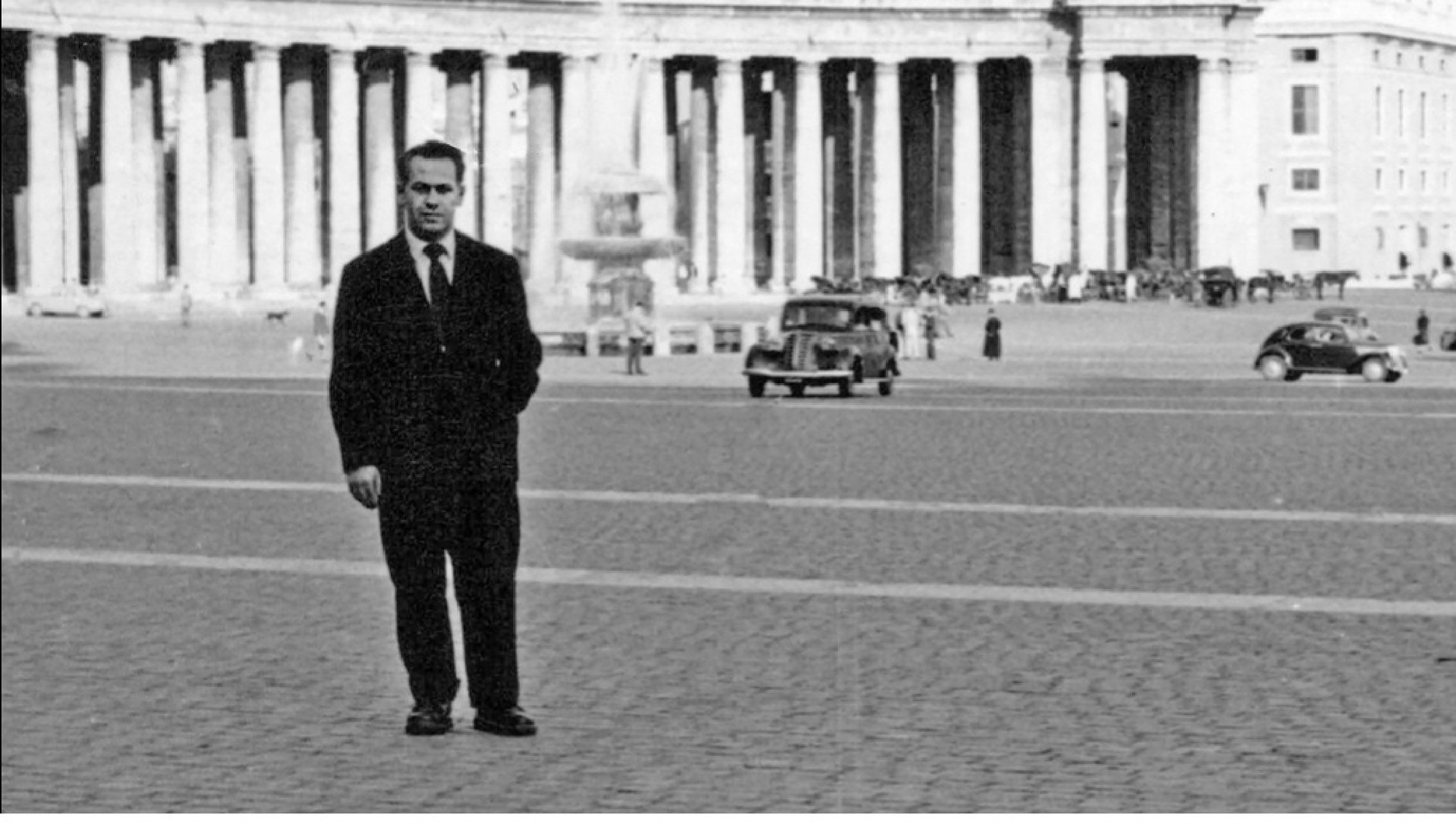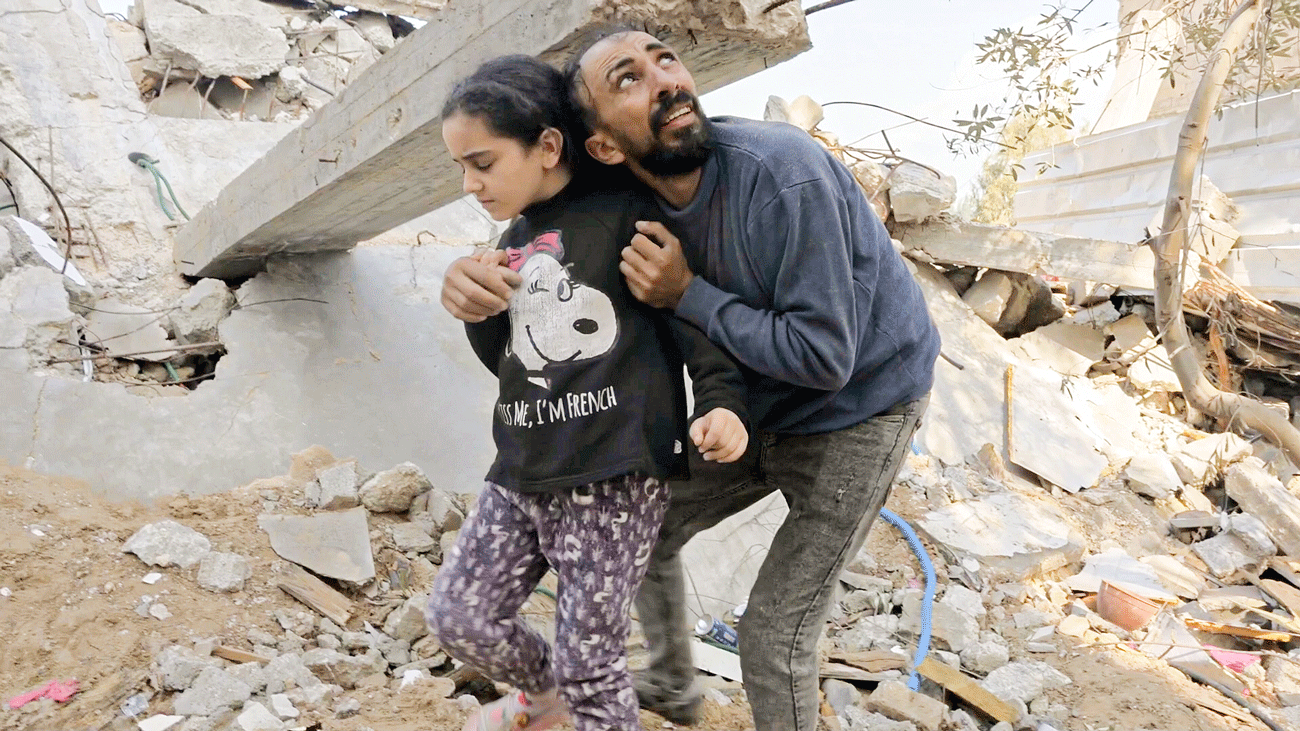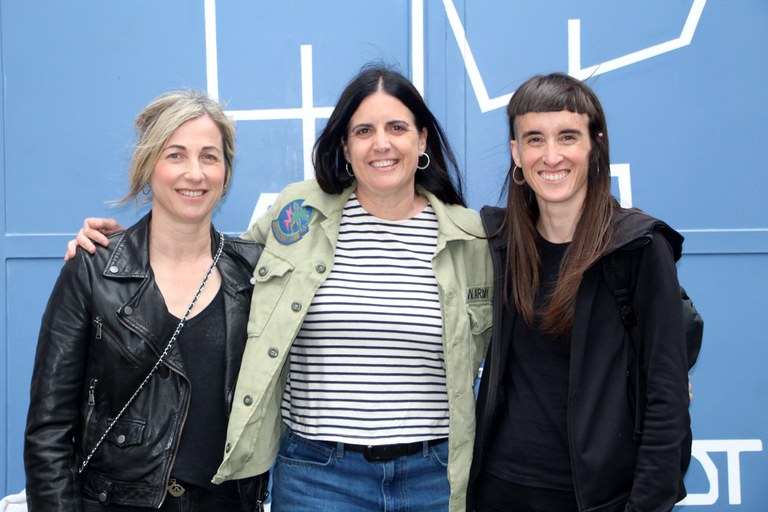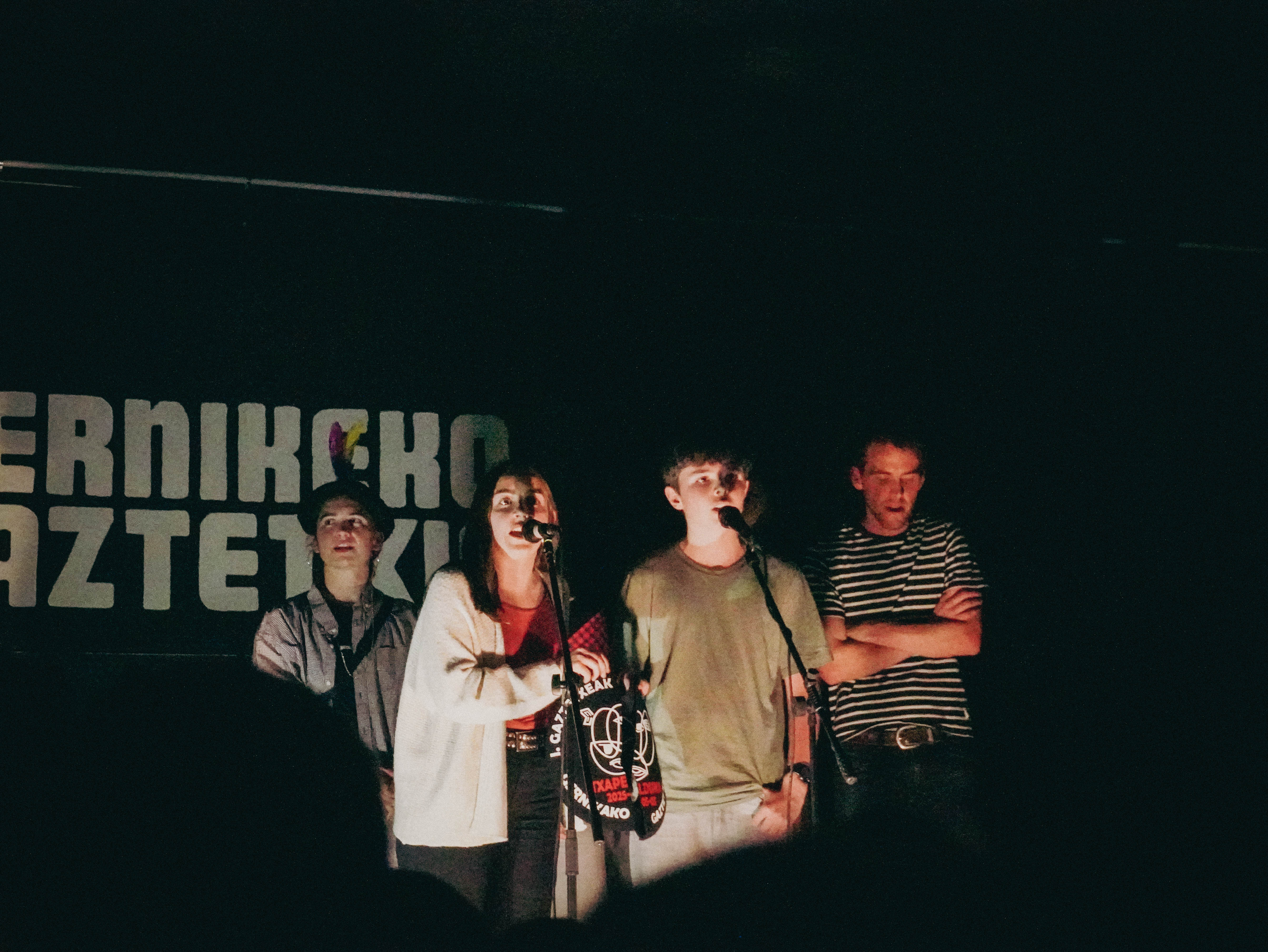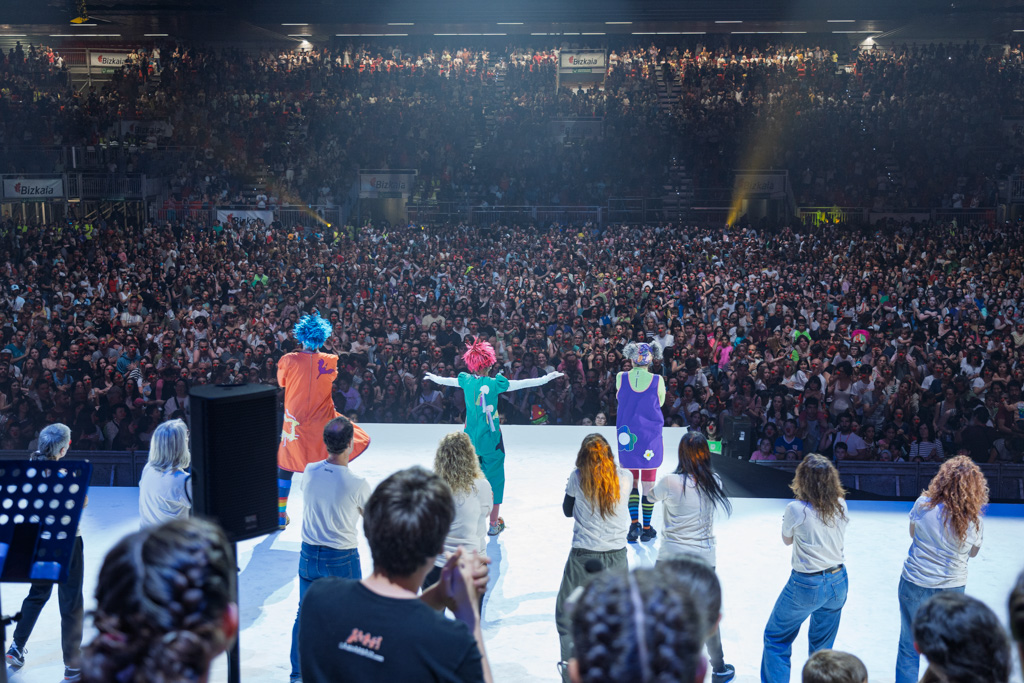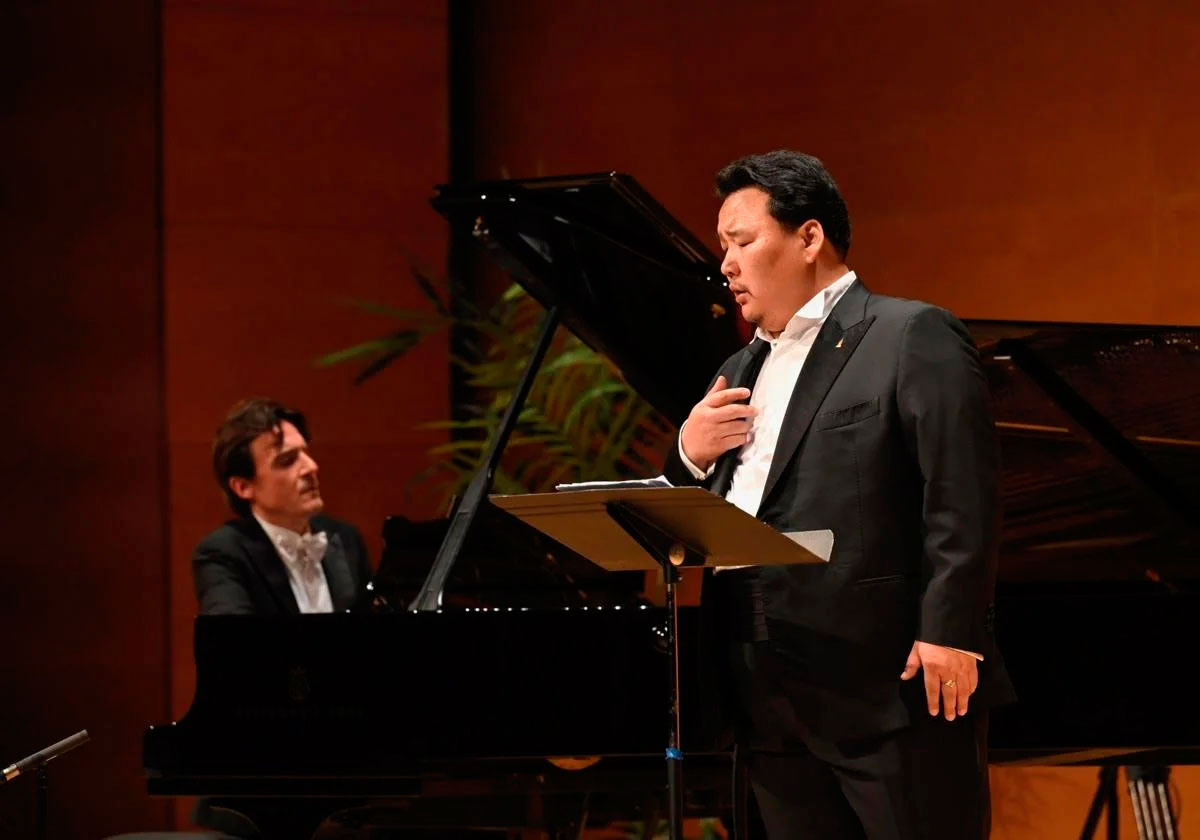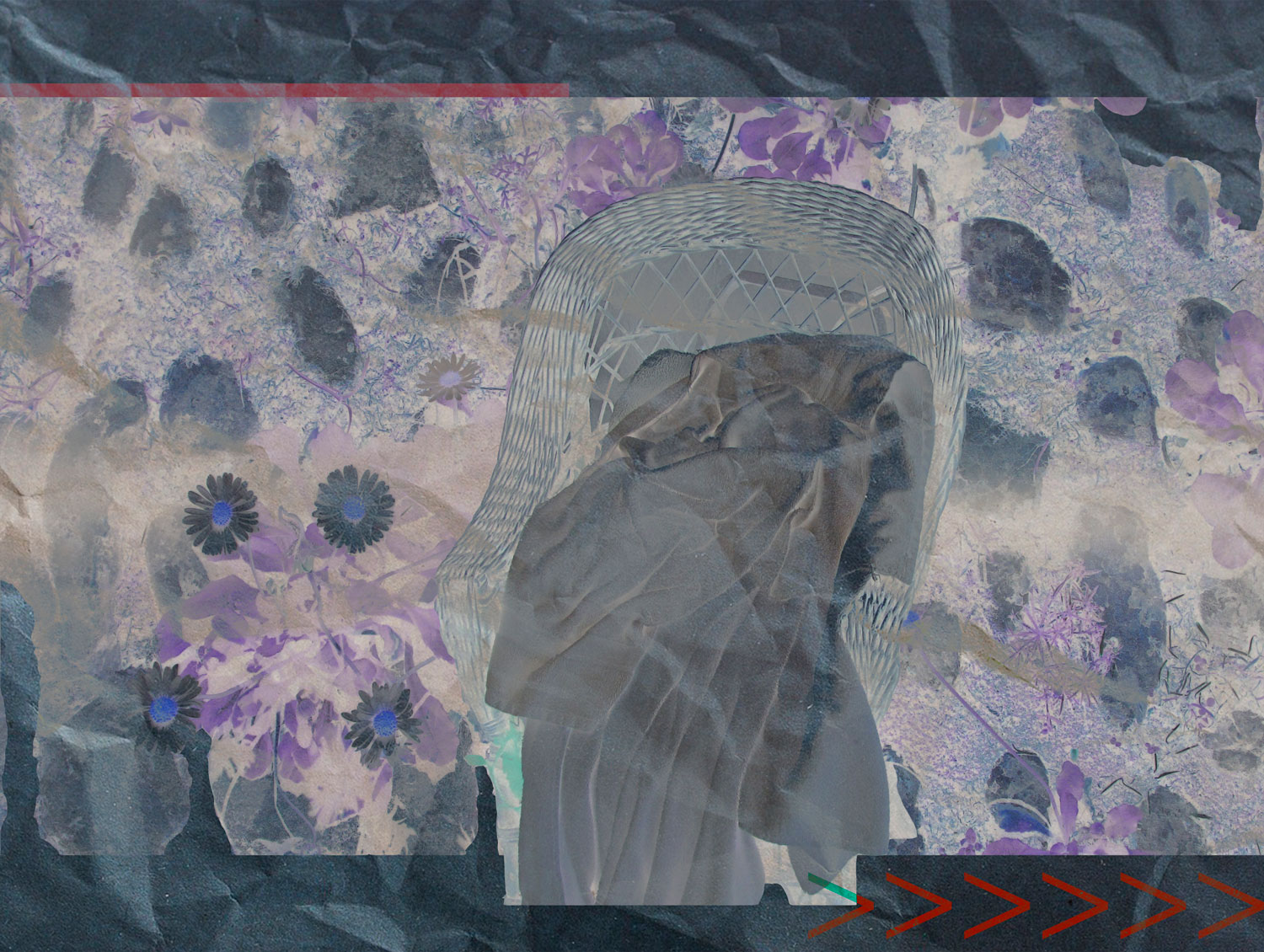"Without immaterial heritage there would be no culture. And what would a computer be?"
- Graxiana Castillon (Eskiula, 1994) has had the home of Eskiula as a house of culture to speak in Basque from a young age with those of the house and to learn songs and entrexatas of Xiberoa. Since then, he has participated in numerous cultural projects and shows both in the organization and on the stage. At Maule's newly inaugurated "Xirikota" facility, the tireless dancer tells us about dance, the place of her wives, the transmission of culture or the character of it.

Have you learned to do interxatas before learning to walk?
I'm from Eskiula, and it's true that I've learned dance from a young age with my grandfather, he's always been dancing and my uncle, too. I've grown up at home in a dance and culture environment, because my parents also sing ... But it is true that we have always had a special relationship with grandfather about dance, I have always heard him say: "If you don't like to do interxatas and doubles with boots, you're not worth it," it's always been that complicity, and today it's always following very closely everything I do.
Have you learned Basque as a child?
"In Eskiula, my brother and I are the only young people in Euskera, in our age there is no more than that, that's right."
I've learned Euskera at home because the ikastola was very far from Eskiula, so I went to the French school of Eskiula and then to the school of Oloro, in Biarno, on the border with Eskuila. I have learned Basque from a young age, but in my childhood there has been a time when I did not want to speak in Basque, I repeated every day "Moi pas de euskara". In school, I didn't understand others well when they spoke French and there was a vacuum. So I started studying French at school, and that led me to say that for a long time I had no words in Basque. Later, I realized that I had Euskera, that I was missing, especially when my brother was born and I went through more people through Zuberoa. Since then we have always been in Euskera at home, with the whole family.
It says that you also go out to sing on stage.
Yeah, I've done both singing and dancing since I was a kid. My mother would teach singing lessons every morning, sing for an hour and dancing for an hour. My parents, on the other hand, with the Laguna group, gave a concert every weekend by Zuberoa, so I also went from town to village every weekend, in the front line plaza, in my bank, looking and learning to the parents.
"In almost all the towns of Zuberoa there is a dance school with lots of teachers and students"
Then in Eskiula, when I was 18 years old we made a face mask and I started offering spectacular in my village, I have walked a lot through Zuberoa participating in different creations. For example, with the Berritza Company we offer Bakuna Show, in a Üda, in shows, in which we include contemporary dance, together with the Xiberotarra dance. In the creation of Baküna Show the xiberotarra dance was the protagonist but it was something new to us. We went further in contemporary dance with choreographer Fábio López and we lost a little bit, questions began to arise, or how we wanted to go with contemporary dance, what our steps were left, what we were, what was the limit ... There I realized that our dance in Zuberoa was going to lose something if the contemporary was going too far. I love contemporary dance, but to save our culture and make it go further, I don't know where the border is and how far it can go, it's not easy.

Is it important to retain the immaterial heritage?
"Without a woman, today, Zuberoa's dances would have been lost"
If there was no immaterial heritage, there would be no culture. We would be natural people, but we couldn't be anything. Perhaps one of them is terribly strong, because so we live in Zuberoa, my life is about dance, singing, language, so I see my life and that of my friends. Also in other countries, such as France, culture is basic to many people. Without that we are nothing if we can and lose, what would we be? A computer? For example, in Eskiula I see that there will be no more masks or shepherds and there I see that our culture, our immaterial heritage, is being lost a little; without objective, without spectacle on the target, dance and music are being lost in theatre, so there will be no dance or singing courses for the children.
Does a point of sadness appear when referring to Esquila?
In skiing there has always been some push in the village, then with the confinement a lot has changed and maybe that has created strange feelings; maybe that's why I'm talking quite pessimistic. Maybe the world will start again normally, and things will start again, I'll be calmer. On the border with Biarno there are many people linked to Basque culture, but others do not. This reality occurs, fundamentally, throughout the Basque Country, but it is true that the fact of being on the border influences more in many respects. So you can rearrange the masquerade or the pastoral, but you have to do a quick job. Then it is true that I am not too much in Esquila now, I have the trade in Maule, I live there and I move a lot through Zuberoa. It is true that by being there we can do things. With the Basque one can also say the same, in Eskiula my brother and I are the only young people we are talking about in Euskera, there is nothing else in our age, that is it.

Are young people involved in cultural activities today?
I won't tell you no, that's what I'm doing! In almost all the towns of Zuberoa there is a dance school, with a large number of teachers and students, many creations are also made and this has boosted young people in recent years, they have been aroused the desire to see what can be done, both in traditional shows and in creation, simple things between friends or larger shows. Every year there is also masked, pastoral, every year a town takes on the organization of great appointments, working on the crunch, learning songs, dances, preparing costumes, and that always gives a boost. There is always someone who comes with a nice idea and hop! We put it together with friends. There are many of us who want to push things forward here.
"At first I didn't think I was going to use Euskera so much in trade."
In the workplace, it has moved from patient care to gas sales.
First I was in Basque school studying Basque and then I studied nursing, but I have always wanted to open a hostel in my memory. Then it is true that the inn is a hard job, so I started to see what was missing in Maule and decided to open the gas station. Then I love that land because my father and my mother are labourers, I know that world well. On the other hand, working in Zuberoa is normal for me, because I don't see myself anywhere else.
With the store's name, I asked my father to help me choose, because it's common for me to write the lyrics of the songs, and he proposed "Xirikota." Then the brother answered, astonished, that the threshing was the grass of the pigs. But it's true that the word "Xirikota" is beautiful in the ear, so we agreed. At first I wanted to name "Jin, jan, jun," a phrase that my parents have repeated to me so many times, and that, by the way, reveals my character, temperament, eating and marching. In the end, because it was too long, we've held it like a stanza to put it in trade and put the name of "Xirikota" on the door.

Is it important to know Basque to be a trader in Maule?
It's very important of those there, and at first I didn't think I was going to use it so much during the day, because when people get into commerce, they almost always greet me with a water hon and not bonjour, and I'm happy. Then making bilingual communication is not always easy, social media management also takes a long time.
"I've grown up at home in a dance and culture environment, because my parents also sing."
Dancer, singer, entrepreneur... Has the feminist wind blown in Zuberoa?
It is not by force a claim, it is my character, I am like that, I do not seek anything special, I do it as it comes. Then, the show Topa Noka has been the first to address the issue of the place of women, both in the world of dance and in society, and it is true that its recognition and dedication in the plaza has been important, knowing that in the dance of Zuberoa the woman had no place before and knowing that without her, today, the dances of Xibero would be lost. It's also true that working on that show, looking at the pictures, listening to the conversations, we realized a lot about our wives. In the audience’s reactions, many women found it a very beautiful show and thanked us, while men… I don’t remember anything, or yes, my grandfather was very happy. So I did say it in the plaza was very important, but then I didn't claim it in my life, I do it just as I think.

Do you have a special project in your head?
We have in hand a very varied project, for example, we are preparing a new show with Topa Noka, a new frustration about the rhythm. The pace, the pace, the pace of life we have since we are young, the pace of feelings, the pace of globalisation, the rhythm that has broken in time of confinement and what has happened at that time. We are aware that the world and globalisation impose a rhythm on us, because we have come up with the idea of creating different things, from a frustration.
"I realized that our dance in Zuberoa lost something if it got too much into the contemporary style."
We then decided to return to the Berritza association with a friend. We want to work with youth so that they feel like getting involved in cultural activities; for example, we carry out a work to expand teaching and practice, to disseminate and structure the theater, dance, music, song... Then we will work to learn how production or co-productions are carried as volunteers. The third area will be to bring the smaller groups, for example, how a show starts in the small group, to ask for subsidies, write a creation, assemble a montage, put music, etc. We want to help young people who want to move in culture take those steps. Now we want to do everything that has been offered to us by a lot of people, we have to carry that broadcast work absolutely, that there is no silo. We have to work on it, it's very important to give what I've had.

How do you experience these strange COVID-19 times?
It has been quite hard, fortunately we had a creation in mind and we have started to create. We have also taken advantage of this time to bring forward the work of reviving Innovation and I believe that we have thought well about partnership and have done well. Then all the other aspects of Covid-19 were tough, we were losing all of them. It has happened to me personally to think: "What am I and what do I do?" The work agreed, but then? There I have really seen the importance of that immaterial heritage, apart from the work that needs to be done, that without those things that people do to us, without songs, without dances, we are nothing. I was truly lost. Then we took back strength, it was also a masquerade taken clandestinely, and when we had the opportunity to sing again slowly, seeing that we have lost nothing, we have calmed down.

Do you have a dream to fulfill in your life?
I had a dream when I was 18, I wanted to be a professional dancer, except here in fact, I realized that it was not easy, that I was far from my life. It doesn't hurt me anymore, because I found my way and I can dance every day here... However, with the Berritza association we want to take that work, that is, if a young man here wants to dedicate himself to dance, we want to be there to help him give it.
If not, for culture to live and Euskera to also live, that is my dream.
Could it put an end to an issue that we have not mentioned?
No, I think we've turned around.
BRN + Auzoko eta Sain mendi + Odei + Monsieur le crepe eta Muxker
Zer: Uzta jaia.
Noiz: maiatzaren 2an.
Non: Bilborock aretoan.
---------------------------------------------------------
Ereindako haziek ura, argia eta denbora behar dute ernaltzeko. Naturak berezko ditu... [+]
Euskadi markak, eraikuntza sektoreko ekonomiaren estrategian, “industrializazioa” mantrarako hitz gisa hartu duela jakinarazi berri du Eusko Jaurlaritzak. Etxebizitza publikoaren eraikuntzan industrializaturiko prozesu eta elementuak lan guztien %65a izatea... [+]
Last week, during the blackout, seeing ourselves vulnerable, we began to investigate many people in order to understand what happened: how does the infrastructure that transports electricity work? Why is it getting old? I am fascinated by the physical phenomenon of electricity... [+]
Aurreko tertuliako galderari erantzuteko beste modu bat izan zitekeen, akaso modu inplizituago batean, bigarren solasaldi honetako izenburua. Figura literarioaz gaindi, pertsonaia zalantzan jartzeko, edo, kontrara, pertsonaiaren testuingurua ulertzeko saiakera bat. Santi... [+]
Now that everyone has become more Franciscan than the Pope, it’s worth remembering our unsurpassed classics. There was one in the 17th century, his grace was Arnaut Oienart. And since we can’t immerse ourselves in all his works, today we will praise O.ten youth in... [+]
“We rehearsed, we showed it to the boys, we were there when they needed help for the grill, but then we never danced in the square or even crossed our mind.” Oihane Auzmendi Iturbe (Legazpiia, 1977) is a dancer of the dance group Roots, but for years he did not have the... [+]
Amartuvshin Enkhbat baritonoa
Pianoan: Stefano Salvatori.
Antolatzailea: OLBE.
Zer: Verdi, Mascagni, Leoncavallo eta Giordanoren operen ariak.
Non: Bilboko Euskalduna Jauregian.
Noiz: martxoaren 29an.
Martin Martina and the Mystery of the Golden Comb
by Amancay
Gaztelañaga Batu, 2024
-----------------------------------------------------
Amancay Castañaga launches the mystery of Martín Martina and the golden comb accompanied by the illustrations of Alain Martínez... [+]
The annoying noise of the works of the neighbors has awakened me even today. I put my head on the pillow, and I tried to sleep for another twenty minutes, but there was no one to shut that drill down. I woke up and looked at the table of duties that I did at the beginning of... [+]










.jpg)
